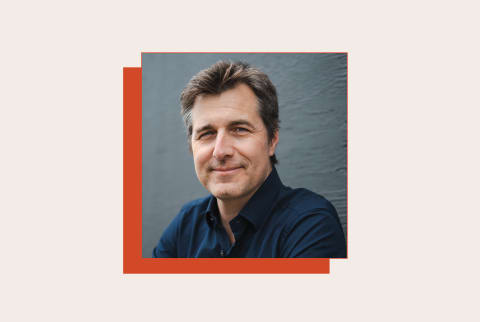Advertisement
A Top Psychologist's 3 Must-Have Tips To Overcome Performance Anxiety


You've probably heard a million times: Confidence starts from within. If you don't believe in yourself, how can you expect anyone else to follow suit?
Well, according to top performance psychologist Michael Gervais, Ph.D., author of The First Rule of Mastery: Stop Worrying about What People Think of You, the phrase could not be more scientifically true. The key to overcoming anxiety, he shares on this episode of the mindbodygreen podcast, is to focus on what you can control—yourself!
But how do you influence your inner world? "The main skills are awareness, self-talk, and breathing," he says. Allow Gervais to elaborate below:
Awareness
Take it from Gervais: "You're not really in the game of becoming your very best without awareness." Everyone from the highest-performing athletes to the greatest public speakers must foster a sense of awareness, he declares. Awareness has even been shown to improve performance in daily tasks1 in research settings. "So ground zero is awareness training," he adds.
And awareness training comes in three forms: mindfulness, journaling, and conversations with people of wisdom. You can engage in any of the three to increase your own awareness, Gervais says. Consider a deep meditation, or here are some journaling prompts tailored to self-discovery, if you need some inspiration.
Self-talk
Once you cultivate a greater sense of awareness, it's time to become aware of how you speak to yourself. Do you frequently engage in critical, self-deflating, non-facilitative self-talk? Try to reframe the narrative.
Now, that doesn't mean you must stand in front of a mirror and repeat affirmations. It's about being aware of your thoughts and how they influence your emotions and behaviors. "Thoughts, feelings, emotions, and behaviors influence performance," says Gervais. So he recommends having an empowering phrase you say to yourself whenever you experience negative thoughts.
"For me, one of the most dynamic things that I can say to myself is, 'I can do hard things,'" Gervais explains. "Study yourself. Know what statements help back you in high-stress environments. We're leaving it all up to chance if we don't have a sense of how we want to speak to ourselves in those moments."
If it helps, you can work backward: Write down an ideal mindset you want to have during a high-stakes moment (a speech or presentation, perhaps), then write down the thoughts you need to speak to yourself in order to back up those emotions. Give your mind clear examples to call upon during moments of anxiety.
Breathing
Finally, we have breathwork. Your breath is a powerful tool for stress. Something as simple as making your exhale longer than your inhale has been shown to2 send the body into a more parasympathetic state, lowering blood pressure and cortisol levels.
"Breathing is meant to be able to help you find that ideal state where the porridge isn't too hot, it's not too cold, but it's just right," Gervais says. (Meaning, the stressors don't feel as earth-shattering.) "That activation level inside of you is just right," he adds.
There are plenty of breathwork exercises you can choose from, but one of our favorites happens to be box breathing—the practice comes from Navy SEAL training and is thought to heighten efficiency, performance, concentration, and stress relief.
Start by releasing all of the air from your chest and hold your breath for four seconds; then breathe in through the nose for four seconds; then hold your breath for four seconds; then exhale out of the nose for four seconds. If you can, repeat this cycle for five minutes to feel the effects.
The takeaway
Awareness, self-talk, and breath—with these three skills, you can conquer any stressor that comes your way. You may not be able to control your environment, but you can control how you show up in the world. That, says Gervais, is the most valuable superpower you can master.
We hope you enjoy this episode! And don't forget to subscribe to our podcast on iTunes, Google Podcasts, Spotify, Amazon Music, or YouTube!
Watch Next
Enjoy some of our favorite clips from classes
Enjoy some of our favorite clips from classes
What Is Meditation?
Mindfulness/Spirituality | Light Watkins
Box Breathing
Mindfulness/Spirituality | Gwen Dittmar
What Breathwork Can Address
Mindfulness/Spirituality | Gwen Dittmar
The 8 Limbs of Yoga - What is Asana?
Yoga | Caley Alyssa
Two Standing Postures to Open Up Tight Hips
Yoga | Caley Alyssa
How Plants Can Optimize Athletic Performance
Nutrition | Rich Roll
What to Eat Before a Workout
Nutrition | Rich Roll
How Ayurveda Helps Us Navigate Modern Life
Nutrition | Sahara Rose
Messages About Love & Relationships
Love & Relationships | Esther Perel
Love Languages
Love & Relationships | Esther Perel
What Is Meditation?
Box Breathing
What Breathwork Can Address
The 8 Limbs of Yoga - What is Asana?
Two Standing Postures to Open Up Tight Hips
How Plants Can Optimize Athletic Performance
What to Eat Before a Workout
How Ayurveda Helps Us Navigate Modern Life
Messages About Love & Relationships
Love Languages
Advertisement

Yes, There's A Longevity Vitamin (& People Over 40 Need To Prioritize It)
Molly Knudsen, M.S., RDN

Study Investigates How Fasting Impacts Sleep, Hormone Health & More
Gretchen Lidicker, M.S.

Yes, There's A Longevity Vitamin (& People Over 40 Need To Prioritize It)
Molly Knudsen, M.S., RDN

Study Investigates How Fasting Impacts Sleep, Hormone Health & More
Gretchen Lidicker, M.S.

Yes, There's A Longevity Vitamin (& People Over 40 Need To Prioritize It)
Molly Knudsen, M.S., RDN

Study Investigates How Fasting Impacts Sleep, Hormone Health & More
Gretchen Lidicker, M.S.

Yes, There's A Longevity Vitamin (& People Over 40 Need To Prioritize It)
Molly Knudsen, M.S., RDN

Study Investigates How Fasting Impacts Sleep, Hormone Health & More
Gretchen Lidicker, M.S.














